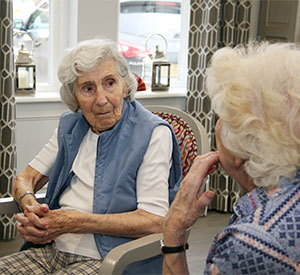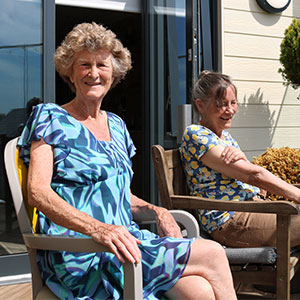When the time comes for your loved one to relocate to a care facility, you may be wondering “What’s the difference between care homes and nursing homes?” With these and other similar terms often used interchangeably, it can be difficult to know what type of care you’re looking at. Let’s delve deeper into care homes vs nursing homes to give you an idea of which one might be right for your ageing family member or friend.
“Care home” is an all-encompassing term that describes a place where seniors live and receive the care they need to manage daily life. Nursing homes and residential homes are two types of care homes. They both provide living accommodation and 24-hour support to residents.
The difference is that nursing homes have registered nurses on site 24 hours a day, increasing the cost to live here. As a result, nursing homes are typically reserved for residents with long-term mental or physical health issues who require constant monitoring and regular medical attention.

Residential care homes offer round-the-clock support for residents who need assistance with daily tasks. Such homes are best suited for older adults who can no longer safely live independently. Residents may stay here long-term or for temporary respite care.
Staff members at residential care homes are trained to provide personal care on a daily basis. This includes:
The only limitation is that residential carers aren’t qualified to provide medical care. They can administer medication, but a district nurse or local general practitioner must be called if medical attention is required.

The only limitation is that residential carers aren’t qualified to provide medical care. They can administer medication, but a district nurse or local general practitioner must be called if medical attention is required.
Every resident gets their own bedroom, usually with an en-suite toilet and shower. Residents are encouraged to personalise their space with photographs, trinkets and other meaningful items. Communal areas include dining rooms, lounges, assisted bathrooms and outdoor spaces. Some care homes are large, housing over 100 residents, whilst others are small with only 10 or 20 residents at a time.
In addition to receiving 24-hour care, residents can thrive in a residential care setting thanks to greater access to physical activities, social events and planned outings. The facility may also offer ways for residents to enjoy their favourite pastimes, such as playing the piano, making art, gardening, and playing board or card games. In addition, there are often provisions for residents to bring their own furniture or even pets from home.
Although nursing homes are traditionally the place to receive dementia care, certain residential homes can accommodate people with this illness as well. Some facilities even specialise in certain types of dementia, with staff members trained in caring for people with specific mental health issues or challenging behaviours. If your loved one has late-stage dementia, look for residential homes with Elderly Mentally Infirm (EMI) units to accommodate residents who are prone to wandering or who show verbal or physical aggression.

As with residential homes, nursing homes provide 24-hour care for their residents. However, this care is provided by a team of registered nurses supported by care assistants, ensuring access to expert, round-the-clock medical care. These services are an important part of managing chronic symptoms and identifying changes to a resident’s condition. Your loved one is most likely to require nursing care if they are already under a medical professional’s supervision.
Nursing homes are sometimes referred to as care homes with nursing. Accommodation is similar to residential care homes, with individual en-suite bedrooms and shared communal spaces for residents to enjoy.
Nursing homes also give residents access to stimulating social activities and opportunities to enjoy their beloved pastimes. They are also likely to share close ties with local schools and educational centres. These interactive visits from young people provide the residents with the opportunity to socialise, give gifts or to be entertained with live performances.
What is the Cost Difference Between Care Homes and Nursing Homes?
Nursing homes typically cost more because of the need for additional resources and highly trained medical staff. The difference can be upwards of £180 per week compared to residential care homes.

Your financing options include self-funding, if you can afford it, you may also be eligible for support from a local authority. If your loved one has been assessed and deemed to have nursing needs, they may be eligible for Funded Nursing Care (FNC) or Continuing Healthcare (CHC). These programs are available to those who demonstrate financial need. Funds are paid at a flat rate directly to the nursing home to help offset or completely cover the cost of care. FNC and CHC are made possible thanks to contributions from the NHS.
You know it’s time to consider a care home if your loved one:
It can be difficult to identify if your family member needs specific care without the proper training and expertise. That’s why you should get a needs assessment from your local authority. This free service aims to assess the care needs of anyone who requires extra help as they age. Within a week of the assessment, you’ll receive a support plan recommendation Which will point you towards either residential care or a nursing home.

Once you identify whether your loved one needs residential or nursing care, the final step is to find the ideal care home based on your needs. Here are some considerations to keep in mind:


Choosing the right care home can be a difficult decision. That’s why Country Court Care strives to make the process as easy as possible. We encourage you and your loved one to visit our residential care and nursing homes at any time to meet the staff and other residents, sample our wonderful catering, and get a feel for what it’s like to live here. Our motto is “Our family, caring for yours,” which we exhibit daily in the high-quality care we offer our residents. For more information or to request a brochure, please contact us today.